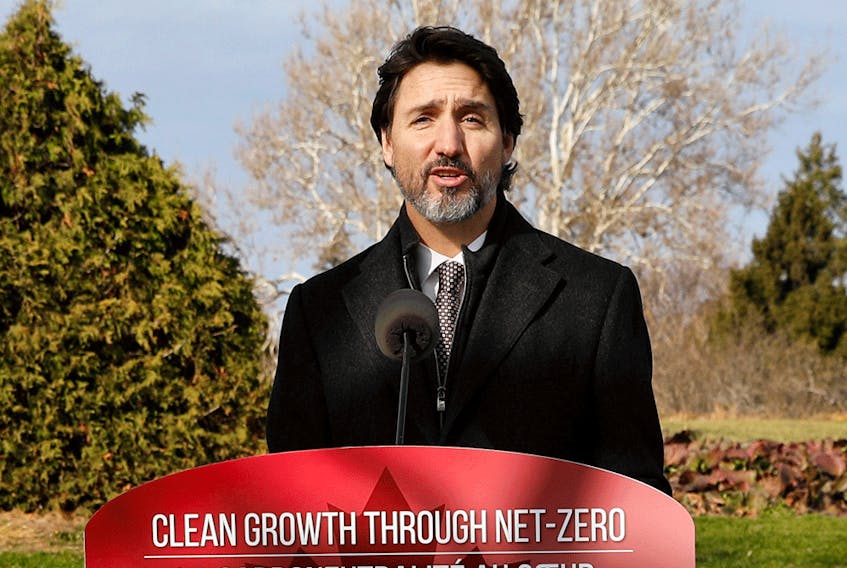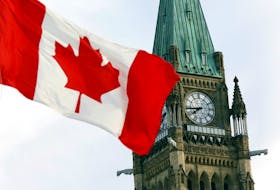OTTAWA – The Liberals announced a new climate plan Friday that will see the carbon tax jump from $50 per tonne in 2022 to $170 per tonne by 2030.
The carbon tax hike was met with dismay in some provinces with Ontario Premier Doug Ford calling it a tax grab and Alberta Environment Minister Jason Nixon saying it was Ottawa imposing its values on the province.
The plan will see $15 per year increases from 2022 to 2030 and will raise the cost of gasoline, natural gas home heating and other goods dependent on fossil fuels. But the government says most families subject to the federal tax will recoup more than they pay through rebates, which will soon be distributed quarterly instead of annually.
It also includes $15-billion in spending on items such as energy-efficient building retrofits, renewable energy projects, incentives for zero-emission vehicles and funding for Indigenous and remote communities to move off diesel fuel.
“There is no vaccine against a polluted planet,” Prime Minister Justin Trudeau said in announcing the plan. “It’s up to us to act, because there is a real cost to pollution.”
The Ontario premier, whose government is challenging the carbon tax as unconstitutional, took a different tone.
“Folks, this carbon tax is going to be the worst thing you could ever see,” Ford said. “I’m a strong believer of protecting the environment. But you don’t have to protect the environment on the backs of the hard working people of this province and this country at a time when people are barely holding on by their fingernails.”
Ford called it a tax grab and said he’s “never, ever, ever been more disappointed in an announcement ever since I’ve been in politics.”
Federal Conservative environment critic Dan Albas slammed the government for announcing an increase to taxes while a pandemic still rages.
“This increase will mean that Canadians will pay more for groceries, home heating, and add up to 37.57 cents per litre to the cost of gas,” Albas said.
The Conservatives also pointed to the word games that Catherine McKenna, then the Liberal environment minister, had played with the carbon tax ahead of the 2019 election. In June 2019, McKenna had said “the plan is not to increase the price post-2022,” then she later walked that back to say the government’s plan only went to 2022 and it had “no intention” to change the price until it had consulted with provinces.
“The Trudeau Liberals promised that they wouldn’t raise the carbon tax, but that is exactly what they are doing today,” Albas said. “This is just another example of the Trudeau Liberals promising one thing to get elected, and then breaking their promise when they no longer need your vote.”
On Friday, neither Trudeau nor Environment Minister Jonathan Wilkinson would specifically answer when they were asked whether the federal government had consulted with provinces on the plan. Wilkinson only said there had been general “conversations” on the topic with provinces.
“We’ve been very clear as a government that our view is that the price on pollution is the most efficient way to reduce emissions, that incents innovation, and it is a critical part of the plan going forward,” Wilkinson said. “All of the provinces and territories are aware of that, and that conversation will continue.”
There is no vaccine against a polluted planet
The Supreme Court of Canada will soon rule on a provincial challenge that argues the federal carbon tax is an unconstitutional overreach by Ottawa. If the court sides with the federal government, provinces would either have the federal tax imposed on them or be required to ensure their own carbon pricing regime grows equivalently with the federal one.
If the court rules against the federal government, the Liberals may have to go back to the drawing board on their climate plan, depending on what exactly the court says. Trudeau did not say what the government would do if they lose, instead criticizing the provincial governments that have opposed carbon pricing.
“There are some places in this country that still want to make pollution free again,” he said. “We’re not going to do that.”
Alberta’s environment minister called the carbon tax increase “another attack on Alberta’s economy and on Alberta’s jurisdiction.”
Nixon said Alberta is already making progress on reducing emissions through its own programs, such as methane reduction initiatives and hydrogen and carbon capture programs.
“On a federal level, the prime minister continues to impose this Ottawa-knows-best attitude on Alberta, at a time when Albertans can least afford it,” Nixon said.
The plan announced on Friday does not have details on another policy that could increase fuel costs, the Clean Fuel Standard. Officials said those details will be coming soon. However, the government did say those regulations will now only apply to liquid fuels, not gas or solid fuels.
The government will also “explore the potential of border carbon adjustments,” the background documents say, promising Canada will “work with like-minded economies — including the E.U. and Canada’s North American partners — to consider how this approach could fit into Canada’s broader strategy to meet climate targets while ensuring a fair environment for businesses.”
The goal of the climate plan is to reduce Canada’s greenhouse gas emissions to 30 per cent below 2005 levels by 2030, a target that had also been set by the previous Conservative government, but which the government was not on track to achieve. The government says this new plan will put it on track to exceed the target for the first time.
“By further working with provinces and territories, the government is confident Canada can achieve reductions within the range of 32 to 40 percent below 2005 levels in 2030,” the background documents say.
Other items in the plan include:
- $1.5 billion over three years for green and inclusive community buildings, with 10 per cent reserved for Indigenous communities;
- $2.6 billion over seven years for homeowners making their homes more energy efficient;
- $287 million over two years for the Incentives for Zero- Emission Vehicles program, which provides a rebate of up to $5,000 on a light-duty zero-emission vehicle;
- $150 million over three years in charging and refueling stations across Canada;
- $964 million over four years for renewable energy and grid modernization projects;
- $300 million over five years to help rural, remote and Indigenous communities currently relying on diesel to switch to clean energy.
• Email: [email protected] | Twitter: btaplatt
MORE ON THE NEW CLIMATE PLAN:
THE THINGS THEY SAY
“The price will not go up…. the plan is not to increase the price post-2022.”
— Catherine McKenna, then environment minister, in June of last year, before the election. She was replying to questions about a parliamentary budget office report that said the carbon tax would have to rise above $50 a tonne.
THE NUMBERS GAME
The government says the money raised from the carbon tax will go back to households in rebates. The prime minister said an average family of four in Ontario would receive $1,259 when the price hits $95 per tonne in 2025, going up to $2,018 in 2030 — an increase of 60 per cent. But in the same period the carbon tax rises from $95 to $170 — an increase of 78 per cent.
AT THE PUMPS
37.57¢ — Expected rise in the cost of a litre of gas by the end of the decade. (In 1979, Joe Clark’s minority government fell after it proposed an 18¢ tax on a gallon of gas — about 4.5¢ a litre.
NOT THE TREES AGAIN?
As first announced on the campaign trail in September 2019 — after Prime Minister Justin Trudeau met activist Greta Thunberg — and reiterated in the fiscal update almost two weeks ago, the Liberals are again promising $3.16 billion, over 10 years, to plant two billion trees. And to repeat: to date no trees have been planted under this initiative.
Quebec’s big win
The one province that won’t feel the force of a federal government carbon tax of $170 by 2030 is Quebec.
Quebec is exempt from the federal government’s carbon tax because since 2013 it operates a cap-and-trade system and will reap the benefits of that system in the future.
In Quebec, certain companies are capped on the amount of greenhouse gases they emit. Going over that cap requires companies to buy credits, or permits, for every tonne of carbon they exceed.
Canadian prices for permits that Quebec industry can buy were trading at $17 as of Dec. 1. It is estimated that Quebec’s “carbon tax” for 2022 will be about $23 per tonne while the federal carbon tax will be $50 — and raising fast.
As Jack Mintz, economist at the University of Calgary’s School of Public Policy, noted, Quebecers already get cheaper electricity than the rest of Canada.
“That does give producers a huge benefit in Quebec. People who use energy (in Quebec), because the carbon price is lower, are going to have lower energy costs.”
He added, “Quebec, given that its cap and trade system is recognized as a substitute for the carbon tax, and the Quebec price is only $17 Canadian, which is little more than half the (current) carbon tax in other provinces, this produces in Quebec a significant competitive advantage not only internationally but to other markets in Canada. This will be particularly relevant to energy intensive manufacturing such as aluminum.”
Copyright Postmedia Network Inc., 2020









